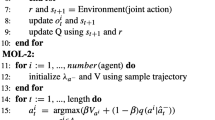Abstract
Researching into the incomplete information games (IIG) field requires the development of strategies which focus on optimizing the decision making process, as there is no unequivocal best choice for a particular play. As such, this paper describes the development process and testing of an agent able to compete against human players on Poker – one of the most popular IIG. The used methodology combines pre-defined opponent models with a reinforcement learning approach. The decision-making algorithm creates a different strategy against each type of opponent by identifying the opponent’s type and adjusting the rewards of the actions of the corresponding strategy. The opponent models are simple classifications used by Poker experts. Thus, each strategy is constantly adapted throughout the games, continuously improving the agent’s performance. In light of this, two agents with the same structure but different rewarding conditions were developed and tested against other agents and each other. The test results indicated that after a training phase the developed strategy is capable of outperforming basic/intermediate playing strategies thus validating this approach.
Access this chapter
Tax calculation will be finalised at checkout
Purchases are for personal use only
Preview
Unable to display preview. Download preview PDF.
Similar content being viewed by others
References
Billings, D.: Algorithms and Assessment in Computer Poker. Ph.D. University of Alberta, Edmonton, Alberta, Canada (2006)
Newborn, M.: Kasparov versus Deep Blue: Computer Chess Comes of Age, 1st edn. Springer (1996)
Sklansky, D.: The Theory of Poker: A Professional Poker Player Teaches You How to Think Like One, 4th edn. Two Plus Two (2007)
Billings, D.: Computer Poker. M.Sc. University of Alberta, Canada (1995)
Davidson, A.: Opponent Modeling in Poker: Learning and Acting in a Hostile and Uncertain Environment. M.Sc. University Alberta, Edmonton, Alberta, Canada (2002)
Schauenberg, T.: Opponent Modeling and Search in Poker. M.Sc. University Alberta, Edmonton, Alberta, Canada (2006)
Frank, I., Basin, D., Matsubara, H.: Finding optimal strategies for imperfect information games. In: Proceedings 15th National/10th Conference on Artificial Intelligence/Innovative Applications of Artificial Intelligence, pp. 500–507. American Association for Artificial Intelligence, Menlo Park (1998)
Johanson, M.: Robust Strategies and Counter-Strategies: Building a Champion Level Computer Poker Player. M.Sc. University Alberta, Edmonton, Alberta, Canada (2007)
Gilpin, A., Sandholm, T.: A competitive Texas Hold’em poker player via automated abstraction and real-time equilibrium computation. In: Proceedings 5th International Joint Conference on Autonomous Agents and Multiagent Systems, Hakodate, Japan, pp. 1453–1454 (2006)
Gilpin, A., Sandholm, T.: Better automated abstraction techniques for im-perfect information games, with application to Texas Hold’em poker. In: Proceedings 6th International Joint Conference on Autonomous agents and Multiagent Systems. Article 192, Honolulu, Hawaii, United States, 8 pages (2007)
Billings, D., Burch, N., Davidson, A., Holte, R.C., Schaeffer, J., Schauenberg, T., Szafron, D.: Approximating game-theoretic optimal strategies for full-scale poker. In: Proceedings 18th International Joint Conference on Artificial Intelligence, Acapulco, Mexico, pp. 661–668 (2003)
Johanson, M., Bowling, M.: Data Biased Robust Counter Strategies. Journal of Machine Learning Research 5, 264–271 (2009)
Teófilo, L.F., Reis, L.P.: Building a No Limit Texas Hold’em Poker Agent Based on Game Logs Using Supervised Learning. In: Kamel, M., Karray, F., Gueaieb, W., Khamis, A. (eds.) AIS 2011. LNCS, vol. 6752, pp. 73–82. Springer, Heidelberg (2011)
Kleij, A.A.J.: Monte Carlo Tree Search and Opponent Modeling through Player Clustering in no-limit Texas Hold’em Poker. M.Sc. University of Groningen, Netherlands (2010)
Van den Broeck, G., Driessens, K., Ramon, J.: Monte-Carlo Tree Search in Poker Using Expected Reward Distributions. In: Zhou, Z.-H., Washio, T. (eds.) ACML 2009. LNCS, vol. 5828, pp. 367–381. Springer, Heidelberg (2009)
Dahl, F.A.: A Reinforcement Learning Algorithm Applied to Simplified Two-Player Texas Hold’em Poker. In: Flach, P.A., De Raedt, L. (eds.) ECML 2001. LNCS (LNAI), vol. 2167, pp. 85–96. Springer, Heidelberg (2001)
Open Meerkat Poker Testbed (2012), http://code.google.com/p/opentestbed/
Author information
Authors and Affiliations
Editor information
Editors and Affiliations
Rights and permissions
Copyright information
© 2012 Springer-Verlag Berlin Heidelberg
About this paper
Cite this paper
Teófilo, L.F., Passos, N., Reis, L.P., Cardoso, H.L. (2012). Adapting Strategies to Opponent Models in Incomplete Information Games: A Reinforcement Learning Approach for Poker. In: Kamel, M., Karray, F., Hagras, H. (eds) Autonomous and Intelligent Systems. AIS 2012. Lecture Notes in Computer Science(), vol 7326. Springer, Berlin, Heidelberg. https://doi.org/10.1007/978-3-642-31368-4_26
Download citation
DOI: https://doi.org/10.1007/978-3-642-31368-4_26
Publisher Name: Springer, Berlin, Heidelberg
Print ISBN: 978-3-642-31367-7
Online ISBN: 978-3-642-31368-4
eBook Packages: Computer ScienceComputer Science (R0)




